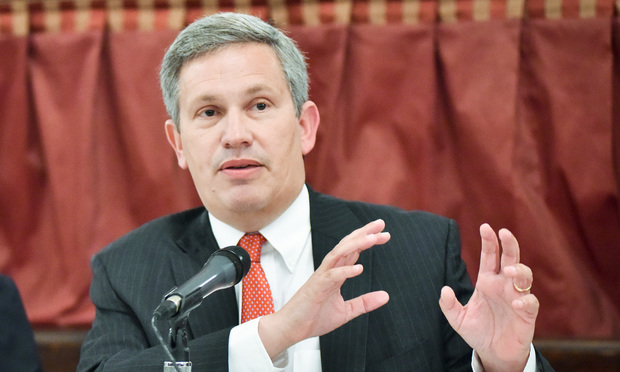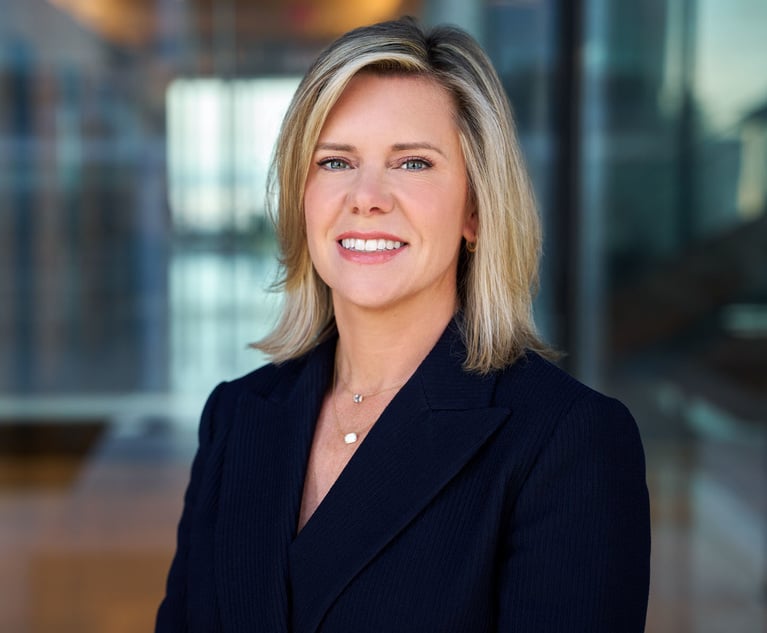NY State Bar Planning Help for Pandemic-Hit Solos, Small Firms
The New York State Bar Association says it wants to help small firms and solo practitioners who have been hammered by the coronavirus and its impact on the economy.
March 26, 2020 at 01:42 PM
3 minute read
 Henry M. Greenberg. (Photo: David Handschuh/ALM)
Henry M. Greenberg. (Photo: David Handschuh/ALM)
While many law firms may be positioned to weather the coronavirus's impact on the economy, some small firms and solo practitioners are scrambling—and the New York State Bar Association is trying to help.
The group is creating an emergency task force to connect small firms and solos with economic aid, help them transition to working from home and advocate for them with state and federal policymakers. More than half of the group's members are solos or work at firms with 10 or fewer lawyers.
"COVID-19 is having a devastating impact on solo and small firm practitioners, many of whom have limited financial resources to draw upon during the crisis," said Greenberg Traurig's Hank Greenberg, the group's president, in a statement. "The task force will focus like a laser beam on these lawyers' immediate needs, in addition to helping them meet the challenges the profession will face when the crisis subsides."
June Castellano, a solo family law practitioner in Rochester, and Domenick Napoletano, a solo commercial litigator in Brooklyn, are leading the group. They said Wednesday that they were still finalizing its membership but plan to act quickly and offer action items to the NYSBA and the New York State Bar Foundation on a rolling basis.
Attorneys at small firms and solo practitioners have said in recent interviews that they lack the capital cushion of some larger firms and are worried about their finances. Echoing points made by some other lawyers, one solo real estate practitioner in New York who declined to be named said both the landlord-tenant litigation side of his practice and the transactional side were at a standstill.
"L&T is frozen. For transactional, I don't know if the deal is gonna go through," said the lawyer. "I always get paid at the close, [because] that's when the guy has all the money."
One possible resource attorneys will be able to use are loans backed by the Small Business Administration, Napoletano said. The $2 trillion stimulus bill passed by Congress on Wednesday would vastly expand the SBA's war chest, according to news reports. And while the Bar Foundation's resources pale in comparison to those of the government, it may also be able to help solos and small firms, said Castellano, who is on the foundation's board.
"We have begun, as a foundation board, to examine what it is we can and cannot do," she said. "We are pretty much exploring everything. We don't have any set plans yet—we are literally in the process of developing what we will be able to do."
While some solos and small firms make frequent use of new technologies or work from a home office, the mass switch-over from an office setting to remote working has been a steep learning curve for others. Castellano said that she has learned how to use Zoom, how to merge calls, and how to coordinate drafting and editing of documents with her remote paralegal with Office365.
"I'm expecting that we are all going to come through this on the other side" with skills that will benefit our practices in the long term, she said.
This content has been archived. It is available through our partners, LexisNexis® and Bloomberg Law.
To view this content, please continue to their sites.
Not a Lexis Subscriber?
Subscribe Now
Not a Bloomberg Law Subscriber?
Subscribe Now
NOT FOR REPRINT
© 2025 ALM Global, LLC, All Rights Reserved. Request academic re-use from www.copyright.com. All other uses, submit a request to [email protected]. For more information visit Asset & Logo Licensing.
You Might Like
View All
Orrick Hires Longtime Weil Partner as New Head of Antitrust Litigation

Profits Surge Across Big Law Tiers, but Am Law 50 Segmentation Accelerates
4 minute readLaw Firms Mentioned
Trending Stories
- 1Perkins Coie Hires Anthony Shannon as Chief People Officer
- 2Who Is Nicholas J. Ganjei? His Rise to Top Lawyer
- 3Delaware Supreme Court Names Civil Litigator to Serve as New Chief Disciplinary Counsel
- 4Inside Track: Why Relentless Self-Promoters Need Not Apply for GC Posts
- 5Fresh lawsuit hits Oregon city at the heart of Supreme Court ruling on homeless encampments
Who Got The Work
J. Brugh Lower of Gibbons has entered an appearance for industrial equipment supplier Devco Corporation in a pending trademark infringement lawsuit. The suit, accusing the defendant of selling knock-off Graco products, was filed Dec. 18 in New Jersey District Court by Rivkin Radler on behalf of Graco Inc. and Graco Minnesota. The case, assigned to U.S. District Judge Zahid N. Quraishi, is 3:24-cv-11294, Graco Inc. et al v. Devco Corporation.
Who Got The Work
Rebecca Maller-Stein and Kent A. Yalowitz of Arnold & Porter Kaye Scholer have entered their appearances for Hanaco Venture Capital and its executives, Lior Prosor and David Frankel, in a pending securities lawsuit. The action, filed on Dec. 24 in New York Southern District Court by Zell, Aron & Co. on behalf of Goldeneye Advisors, accuses the defendants of negligently and fraudulently managing the plaintiff's $1 million investment. The case, assigned to U.S. District Judge Vernon S. Broderick, is 1:24-cv-09918, Goldeneye Advisors, LLC v. Hanaco Venture Capital, Ltd. et al.
Who Got The Work
Attorneys from A&O Shearman has stepped in as defense counsel for Toronto-Dominion Bank and other defendants in a pending securities class action. The suit, filed Dec. 11 in New York Southern District Court by Bleichmar Fonti & Auld, accuses the defendants of concealing the bank's 'pervasive' deficiencies in regards to its compliance with the Bank Secrecy Act and the quality of its anti-money laundering controls. The case, assigned to U.S. District Judge Arun Subramanian, is 1:24-cv-09445, Gonzalez v. The Toronto-Dominion Bank et al.
Who Got The Work
Crown Castle International, a Pennsylvania company providing shared communications infrastructure, has turned to Luke D. Wolf of Gordon Rees Scully Mansukhani to fend off a pending breach-of-contract lawsuit. The court action, filed Nov. 25 in Michigan Eastern District Court by Hooper Hathaway PC on behalf of The Town Residences LLC, accuses Crown Castle of failing to transfer approximately $30,000 in utility payments from T-Mobile in breach of a roof-top lease and assignment agreement. The case, assigned to U.S. District Judge Susan K. Declercq, is 2:24-cv-13131, The Town Residences LLC v. T-Mobile US, Inc. et al.
Who Got The Work
Wilfred P. Coronato and Daniel M. Schwartz of McCarter & English have stepped in as defense counsel to Electrolux Home Products Inc. in a pending product liability lawsuit. The court action, filed Nov. 26 in New York Eastern District Court by Poulos Lopiccolo PC and Nagel Rice LLP on behalf of David Stern, alleges that the defendant's refrigerators’ drawers and shelving repeatedly break and fall apart within months after purchase. The case, assigned to U.S. District Judge Joan M. Azrack, is 2:24-cv-08204, Stern v. Electrolux Home Products, Inc.
Featured Firms
Law Offices of Gary Martin Hays & Associates, P.C.
(470) 294-1674
Law Offices of Mark E. Salomone
(857) 444-6468
Smith & Hassler
(713) 739-1250








